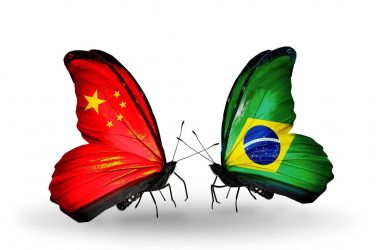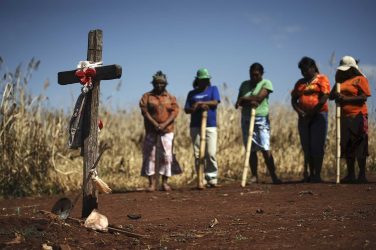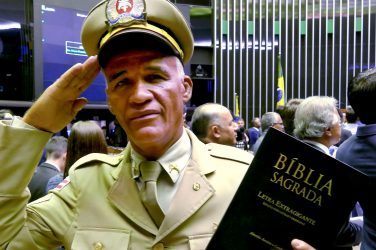US Vice President, Mike Pence, said that Latin American migrants who “cannot come legally” should not go to the US at all. Pence made the comments during a visit to Brazil, where he pledged US aid to Venezuelan migrants.
US Vice President Mike Pence met with Brazilian President Michel Temer on Tuesday to discuss bilateral relations and the region’s Venezuelan migrant crisis.
During a joint press conference in Brasilia, Pence spoke directly to Central American migrants seeking to reach the US: “To the people of Central America, I have a message for you,” Pence said.
“Don’t risk your lives or the lives of your children by trying to come to the United States on a road run by drug smugglers and human traffickers. If you can’t come legally, don’t come at all.”
“Hold on to your children, build your lives in your homeland,” Pence said.
Pence told reporters that his message to Central Americans came “straight from his heart.”
The vice president made the comments after President Donald Trump seemingly backtracked on family separations at the US-Mexican border in response to wide consternation at home and abroad. He did not clarify how families would be kept together or provide details about their housing and legal situation.
Brazilian President Michel Temer said that he had spoken to Pence about Brazilian children who were separated from their parents while crossing the US-Mexico border.
Temer said he asked for Pence’s “special attention to secure the rapid reunification of families” and offered his country’s help to repatriate Brazilian minors.
US Aid
In the joint press conference in Brasília, Pence and Temer said they spoke extensively about the situation in Venezuela.
Brazil’s northern neighbor has been consumed by political and economic crises that have prompted millions of its citizens to flee.
Vice President Pence thanked Brazil for welcoming Venezuelans fleeing their country’s collapse.
“Venezuela’s collapse is creating a humanitarian crisis leading to widespread deprivation, the denial of basic services and starvation,” Pence said, adding that it has “spurred the largest cross-border mass exodus in the history of our hemisphere.”
He pledged US$ 8.5 million in US aid to Venezuelan migrants in the region, including US$ 1.2 million that would go directly to Brazil.
Pence visited the northern city of Manaus in the Amazon rainforest, where he met migrants from Venezuela.
After his trip to Brazil, the US vice president went to Ecuador and Guatemala to meet the presidents of Guatemala and Honduras, along with the vice president of El Salvador to discuss the migration situation on the US’ southern border.
The seemingly contradictory messages underscored the delicate dance the United States is trying to perform: It wants to punish and isolate Venezuelan President Nicolas Maduro’s populist government while mitigating the effects on the Venezuelan people. At the same time, it wants to stem the flow of migrants illegally crossing its own borders.
Venezuela, which is experiencing an economic collapse worse than the Great Depression, was supposed to be the focus of Pence’s trip to the region this week before controversy over American immigration policies in recent weeks forced the vice president to shift gears.
The Trump administration wants to ramp up the pressure on Maduro, who recently won a second term in an election condemned as illegitimate by the U.S. and other countries.
The vice president praised Brazil’s support of economic sanctions against its neighbor and for taking the lead in efforts to isolate Maduro, even as he said Brazil and other nations in the region should do more.
Other than the discussion of migrants, Pence’s visit appeared light on substance, as was expected given that Temer is deeply unpopular and a lame duck ahead of October elections.
Brazil announced that it officially signed the “Open Skies” agreement, which will allow an unlimited number of flights between the countries, though the pact had long been agreed to. The two countries also agreed to increase space cooperation, though they gave few details. Both leaders said they would work to lower trade barriers after the U.S. imposed restrictions recently on imports of Brazilian steel and aluminum.
Pence’s visit comes at a time when soccer-mad Brazilians have their focus on the World Cup in Russia.
During initial comments to the press, Temer joked that he hoped Pence would support Brazil’s team if it goes all the way. Pence said he would root for Brazil — while he is on Brazilian soil.
DW/MP














